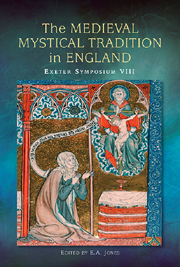 The Medieval Mystical Tradition in England
The Medieval Mystical Tradition in England Book contents
- Frontmatter
- Contents
- Lists of Diagrams and Figures
- List of Contributors
- Abbreviations
- Introduction
- The Colours of Contemplation: Less Light on Julian of Norwich
- Behold Not the Cloud of Experience
- Walter Hilton on the Gift of Interpretation of Scripture
- Numeracy and Number in The Book of Margery Kempe
- Religious Mystical Mothers: Margery Kempe and Caterina Benincasa
- Authority and Exemplarity in Henry Suso and Richard Rolle
- Mortifying the Mind: Asceticism, Mysticism and Oxford, Bodleian Library, MS Douce 114
- The Meditaciones of the Monk of Farne
- Envisioning Reform: A Revelation of Purgatory and Anchoritic Compassioun in the Later Middle Ages
- Walton's Heavenly Boece and the Devout Translation of Transcendence: O Qui Perpetua Pietised
- Reformist Devotional Reading: The Pore Caitif in British Library, MS Harley 2322
- Richard Whytford, The Golden Epistle, and the Mixed Life Audience
- Afterword: Future Prospects
- Index
Mortifying the Mind: Asceticism, Mysticism and Oxford, Bodleian Library, MS Douce 114
Published online by Cambridge University Press: 05 July 2013
- Frontmatter
- Contents
- Lists of Diagrams and Figures
- List of Contributors
- Abbreviations
- Introduction
- The Colours of Contemplation: Less Light on Julian of Norwich
- Behold Not the Cloud of Experience
- Walter Hilton on the Gift of Interpretation of Scripture
- Numeracy and Number in The Book of Margery Kempe
- Religious Mystical Mothers: Margery Kempe and Caterina Benincasa
- Authority and Exemplarity in Henry Suso and Richard Rolle
- Mortifying the Mind: Asceticism, Mysticism and Oxford, Bodleian Library, MS Douce 114
- The Meditaciones of the Monk of Farne
- Envisioning Reform: A Revelation of Purgatory and Anchoritic Compassioun in the Later Middle Ages
- Walton's Heavenly Boece and the Devout Translation of Transcendence: O Qui Perpetua Pietised
- Reformist Devotional Reading: The Pore Caitif in British Library, MS Harley 2322
- Richard Whytford, The Golden Epistle, and the Mixed Life Audience
- Afterword: Future Prospects
- Index
Summary
Often internalising wider cultural concerns and anxieties, asceticism is a phenomenon enacted on the body with the intent of altering the mind. Yet while it is a practice almost universal in application, it is somewhat elusive in definition. Not all self-inflicted pain is ascetic. What some cultures perceive as exceptional behaviour others consider necessary rites of passage. Harm can be inflicted through inspiration from gods or from demons, through sanctity or madness; it can be moderate or extreme. Nevertheless, while different societies have different conceptions and expectations of the body and its rituals, none accepts it in an unmodified state and none views it as unconnected to higher cultural and spiritual concerns. Emile Durkheim writes that:
The pure ascetic is a man who raises himself above men and acquires a special sanctity by fasts and vigils, by retreat and silence, or in a word, by privations, rather than by acts of positive piety (offerings, sacrifices, prayers, etc.).
Durkheim's definition makes two important observations, firstly, that asceticism differs from popular forms of piety, and secondly, that the ascetic has not achieved perfection, but is engaged, through negation, in the transformation of both his spiritual and corporeal capacities. Indeed, modern conceptions of ascesis have elevated it to a notable position in cultural theory, especially in terms of societal structures, discipline and identity. Gavin Flood adds a further dimension to the definition offered by Durkheim which demonstrates the power of asceticism to define not only individuals but wider cultural identities.
- Type
- Chapter
- Information
- The Medieval Mystical Tradition in EnglandPapers Read at Charney Manor, July 2011 [Exeter Symposium 8], pp. 109 - 124Publisher: Boydell & BrewerPrint publication year: 2013


